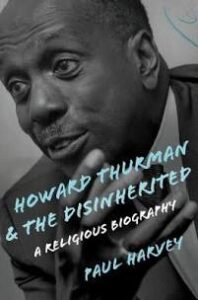 Takeaway: Amazingly, there has not been a good biography of Thurman in so long.
Takeaway: Amazingly, there has not been a good biography of Thurman in so long.
This is the third book by or about Howard Thurman I have read this year, and I have started re-reading the fourth. Howard Thurman is not as well known as I would like. But he was an influential mentor, teacher, and pastor throughout the 20th century. Thurman was born and spent his childhood in Daytona Beach. (He was less than two weeks older than CS Lewis but lived nearly 20 years longer.) Because there was no high school in Daytona Beach that permitted Black students, he was forced to move away from Daytona to go to high school. (There were only three high schools for Black students in the whole state of Flordia.) He then went to college at Morehouse and Crozer Divinity School (the latter two of which Martin Luther King, Jr also went to a generation later.) He graduated as valedictorian at both.
He served several years as a pastor in Oberlin, Ohio, before returning to teach at Morehouse (and Spellman) and work as its chaplain. Four years later, he became Dean of the Chapel at Howard University, where he served for 12 years. In 1944, he became pastor of one of the first intentionally interracial churches in the US, Church for the Fellowship of All Peoples, in San Francisco. He served as pastor there for nine years before becoming the Dean of Marsh Chapel at Boston University, where he served until his retirement in 1965. He moved back to San Francisco, working as a writer, speaker, and mentor until he passed away in 1981.
As much as his work was groundbreaking and important on its own, Paul Harvey shows how Thurman was continually frustrated with his inability to pastor and lead churches and the university system’s religious education as he wished. He was a mystic and thought deeply about what I would consider the sociology of religion.
Howard Thurman is best known for three things. In 1935, he, his wife, and another couple went on a tour of India. The tour brought four Black Americans to India to interact with and learn about the caste system and non-violent resistance. The group were the first African Americans to meet Gandhi. Thurman’s reports about non-violent resistance inspired the Civil Rights movement and led to several others visiting Gandhi.
The second related thing that Thurman is well known for is his relationship with Martin Luther King Jr. Thurman was at Morehouse at the same time as Martin Luther King Sr., and Sue Bailey Thurman, Thurman’s second wife, was a college roommate of Alberta Williams King, MLK Jr’s mother. Despite that family relationship and the fact that there was a year overlap when MLK Jr and Thurman were both at Boston University, it appears that they only spent two extended days together. One day was at Thurman’s house watching baseball while King was a student. And a second day was about a decade later when King was in the hospital recovering after being stabbed. Despite a fairly regular correspondence, they never did spend extended time together beyond that. Thurman gave one of the eulogies at MLK Jr’s funeral.
The third thing that Thurman is known for is his groundbreaking civil rights work. Thurman’s pastorate of what is arguably the first intentionally interracial church and being the first Black Dean of a predominately White University was both significant. His most well-known book, Jesus and the Disinherited, was significant in grounding the civil rights era in Christian and non-violent thought.
Thurman was a thinker, mystic, and mentor more than an actor. He did act, but his most important work was in ideas, teaching, and private mentoring. He was a great preacher more than a great book writer, although he has several books worth reading. Thurman’s biography has to grapple with his ideas, which are not always easy to discuss because part of the reality of mysticism is that mysticism describes the indescribable. Because of that, I would benefit from a second reading because while the timeline isn’t hard to follow, there were places where I wanted to take a second swipe at the description of the ideas.
A second, more detailed, and longer biography (my review) is coming out next, and I will read that one before I re-read this one. But this will be a good option for most people interested in a shorter book. Another good alternative is Thurman’s memoir, which is worth reading, but as was pointed out at several points by Harvey, Thurman concealed as much as he revealed in that memoir.
Sue Bailey Thurman would also be an excellent subject for a biography. Her work was crucial historical documentation, and they made a great team. But when he passed away, Harvey says she culled a lot of the personal material, and it is likely that there will not be enough for a full biography of her.
I am fascinated by Thurman. There has been so little on Thurman that everything seems essential. I am glad that more attention seems to be paid to him recently.
Howard Thurman and the Disinherited: A Religious Biography by Paul Harvey Purchase Links: Paperback, Kindle Edition